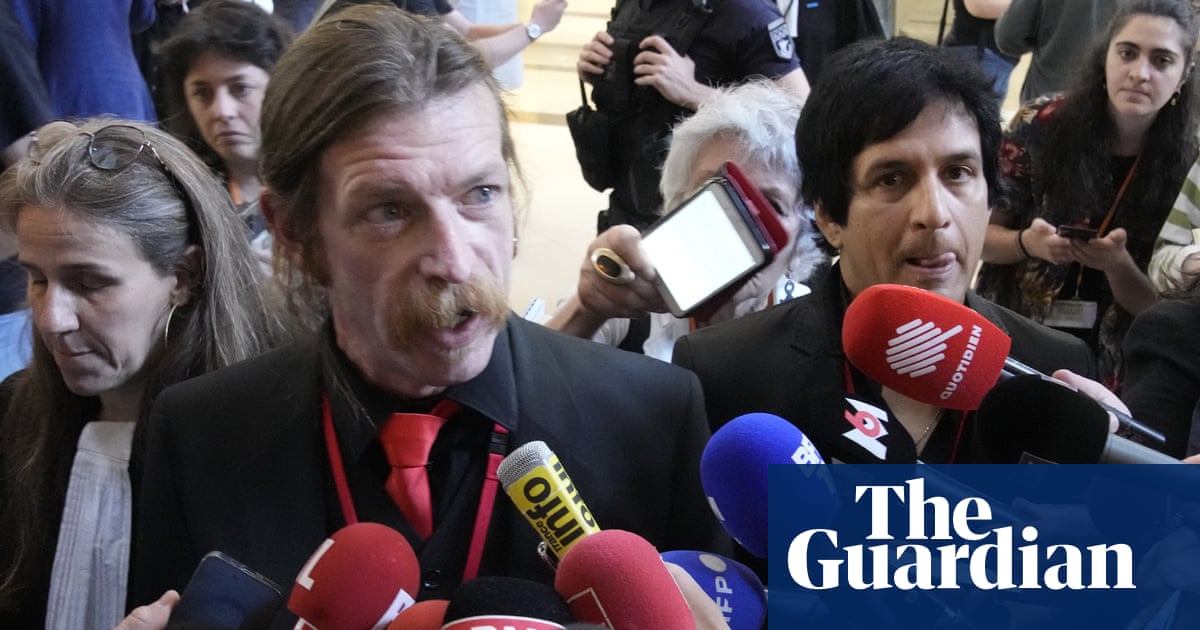
The frontman and the guitarist for the American rock band Eagles of Death Metal have told a Paris court how they watched from the stage in confusion and horror as terrorists opened fire on the crowd at their sold-out concert at the Bataclan in 2015.
Jesse Hughes, the band’s singer, and Eden Galindo, a guitarist, both said the attack, which left 90 people dead, had changed their lives for ever.
They had travelled to Paris to give evidence in France’s biggest-ever criminal trial, over the attacks claimed by Islamic State on 13 November 2015. A total of 130 were killed and more than 400 were injured in synchronised suicide bombings and mass shootings across the French capital, from the national stadium to bars and restaurants and the Bataclan rock gig.
Hughes, 49, said the gig should have been the best of their tour and he had been “really excited” to play in Paris.
He said he recognised the sound of gunfire instantly when three gunmen with suicide vests burst in mid-show and opened fire. “Being from a desert community in California, I know the sound of gunshots,” he said.
While other band members hesitated and wondered what was going on, Hughes said he “knew death was upon us”. He said the band “ran for their lives” while “nearly 90 of my friends [the fans] were murdered in front of us”.
The band escaped through a side door after Hughes had found his girlfriend in the concert hall.
Arthur Dénouveaux, a rock fan who is now the president of the survivors’ group Life for Paris, was among fans who managed to escape at the same time. He led the band members running through Paris streets, handing them €50 and putting them in a taxi to the nearest police station, where they found other fans covered in blood.
During the wait there, they learned that Nick Alexander, who had been working on the band’s merchandise at the gig, had been killed.
A commemorative plaque and flowers at the entrance of the Bataclan concert hall in memory of the Paris attacks of November 2015 in which 130 people were killed. Photograph: Christophe Ena/AP
Hughes said that six years on he still got nervous looking into crowds, and he had been anxious about giving evidence, with emotions rising up that he thought he had got over. But he said: “Evil did not win … You can’t kill rock’n’roll.”
Galindo, 52, said it had been a great show, with everyone dancing, and he had not understood the sound of gunshots at first, thinking it was the sound system. He said there were so many people in front of the stage that they could not move and he recalled the fans’ faces looking up at the band and the stage in confusion as the terrorists opened fire.
“We were thinking that it was going to stop but it just kept coming,” Galindo told the court. “After a while they reloaded and a technician told us: ‘Next time they stop, we run.’” He said that when he had got home to the US he felt “broken” and found it hard to talk about “normal things”.
He eventually left the band. “I’ll never be the same after that night,” he said, adding that he thought of the victims’ families every day.
Hughes, arriving at the courthouse earlier on Tuesday, had been asked by the media how he felt to be in court facing Salah Abdeslam, believed to be the last survivor from the cell of 10 men who struck across Paris that night, as well as several others accused of preparing or helping the attacks.
Hughes said: “I’m a Christian and everyone can be lost and everyone needs to find the way and most of the gentlemen in there do, so I forgive them and I hope that they find the peace of God themselves.”








